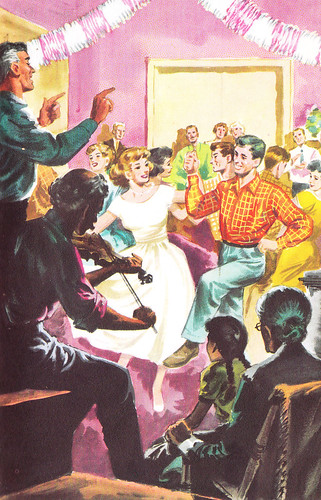Happy Wednesday! It’s time for the latest buzzworthy words that caught our eye. This week: a Beck-worthy eponym, a new Jon Stewart-ism, and a party you definitely don’t want to go to.
Beck’ed
“Kanye West has been ‘BECK’ed’!”
Yaron Steinbuch, “Kanye’s free NYC concert gets ‘BECK’d’,” The New York Post, February 13, 2015
To be honest, we’re not positive what Beck’ed means. What we do know is that in response to Kanye West’s interrupting Beck during his acceptance speech (now commonly known as pulling a Kanye) at the Grammys and saying that Beck should have given his award to Beyonce, an ad agency put up large letters spelling out BECK! in building windows facing a free concert West was giving in the Flatiron District of Manhattan.
We’re guessing to be Beck’ed means to be publicly reminded of a prior “diss.”
debbie downer from mcfly.ttrav on Vimeo.
breaking
“The digital short, ‘That’s When You Break,’ centered on various Saturday Night Live cast members ‘breaking’ (as in, breaking character and laughing) during sketches — with a special emphasis on the infamous breaking duo of Jimmy Fallon and Horatio Sanz.”
Pilot Viruet, “The 5 ‘SNL 40′ Sketches You Absolutely Have to Watch,” Flavorwire, February 16, 2015
While the word breaking could very well be a shortening of breaking character, another possibility is that it comes from or is influence by the phrase break up, or “to convulse with laughter,” as the Oxford English Dictionary (OED) puts it.
While this sense of break up originated in the latter half of the 1800s, we’re not sure when the term breaking character was coined. (It’s not in the OED or Wordnik for that matter). Google Ngrams shows a slight bump for break character around 1860 (although this might have referred to the opposite of build character); another small rise in the early 1910s (perhaps when vaudeville was at its peak), and finally a rapid escalation around 1959.
Corpsing is the British English equivalent of breaking. According to the OED, corpse began as actors’ slang in the 1850s, meaning to confuse an actor during his performance or “to spoil (a scene or piece of acting) by some blunder,” perhaps with the idea of killing a character or scene.
By 1874 the term specifically meant to forget one’s lines, and by the early 1970s, “to spoil one’s performance by being confused or made to laugh by one’s colleagues.”
Brownbacking
“But Stewart brought it back home by noting that Alabama just last year passed an amendment barring the use of foreign law in state court deliberations — and since the Bible was written in a foreign land, ‘you have f—ed yourself with your own statute,’ Stewart told the Yellowhammer State. ‘Or as I hope it comes to be known: ‘Brownbacking’.’”
Peter Weber, “‘Brownbacking’: Jon Stewart tackles gay rights in Kansas, Alabama,” The Week, February 12, 2015
Recently the governor of Kansas, Sam Brownback, “signed an executive order rescinding legal protections for gay and lesbian state employees,” says The Week. In addition, Alabama state Chief Justice Roy Moore ordered local courts to not hand out marriage licenses to same-sex couples, defying a federal court ruling. Moore cited the Bible despite Alabama’s own amendment “barring the use of foreign law,” of which the Bible is, “in state court deliberations.”
Stewart suggested calling such a practice Brownbacking, named for the Kansas governor and playing on the term barebacking, which means to have sex without a condom, especially between men.
chakka
“The ad reaches its lowest point when they call Team India chakka (eunuch) nicely hidden behind the cricketing term also called chakka meaning sixer! *Slow Clap* for the ‘creativity’ of this particular ad-makers.”
Rashmi Mishra, “Pakistan’s response to India vs Pakistan promotional ad of ICC Cricket World Cup 2015 is disgusting!” India.com, February 13, 2015
The word chakka has various meanings across multiple Indian languages, making it ripe for punning. In Malayam, a language of Kerala, the word refers to jackfruit. In Hindi, it’s a cricket term meaning “six runs,” but it’s also derogatory slang referring to either a eunuch, a male-to-female transgender, or the female gentials.
measles party
“California health officials are warning parents not to hold ‘measles parties’ that intentionally expose their children to measles and other childhood diseases.”
Liz Neporent, “Stay Away from ‘Measles Parties’ Docs Warn Parents,” ABC News, February 9, 2015
Since the story broke about anti-vaccination parents possibly holding measles parties, some sources are now reporting that recent occurrences of such types of social engagements may simply be a rumor.
ABC News says measles parties were held “in the 1950s and 1960s before the MMR vaccine program was introduced for measles, mumps and rubella.” In our cursory search, we couldn’t find a primary reference for measles parties being popular during those decades, although we did find a mention from 1914:
You can imagine how shocked they were when they heard of a woman who gave a ‘measles party’ when her children had the disease so that her friends children might get it, too.
Measles parties seem to have made a resurgence around 1998 after a study emerged linking MMR vaccines to autism. However, in 2009 it was revealed that the study’s author “had manipulated patient data and misreported results,” and the paper was retracted in February 2010.
Chickenpox parties were common before the introduction of the varicella or chickenpox vaccine in 1995. But the scare around MMR vaccines seems to have spread to vaccines in general, and like measles parties, chickenpox parties made a resurgence after 1998.
[Photo via Flickr, “Party 1950s Style,” CC BY 2.0 by NinaZed]
